Key takeaways:
- Daily journaling enhances emotional well-being by reflecting on feelings and recognizing patterns in mood and behavior.
- Incorporating journaling into a daily routine can be achieved by pairing it with existing activities, like morning coffee, and creating a comfortable writing environment.
- Using prompts and free writing unlocks deeper emotions and boosts creativity, transforming the journaling experience.
- Reflecting on past entries fosters personal growth and recognition of resilience, turning challenges into valuable learning experiences.
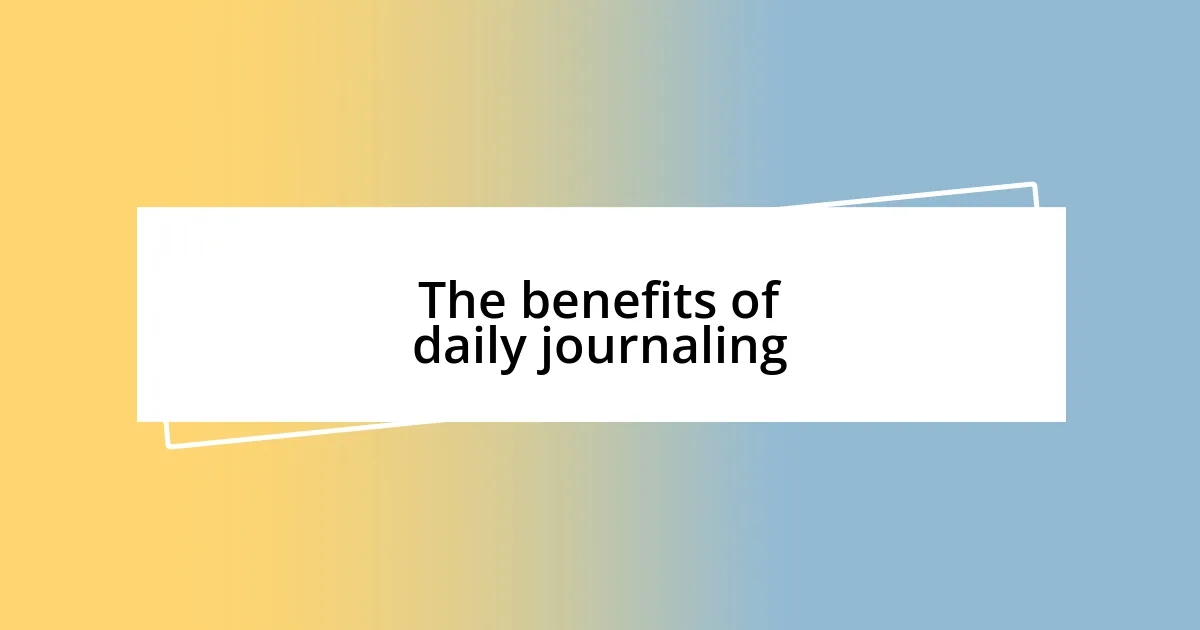
The benefits of daily journaling
Daily journaling has a remarkable way of uncluttering my mind. I remember a particularly hectic week when my thoughts were racing in a million directions. Taking just ten minutes each evening to jot down my feelings helped me gain clarity and allowed me to dive deeper into my emotions—something I didn’t know I needed until I tried it.
One of the most significant benefits I’ve experienced is improved emotional well-being. Reflecting on my day often reveals patterns in my mood and behavior that I hadn’t noticed before. Have you ever felt like you were on an emotional rollercoaster? I found that writing about it not only made me articulate those feelings but also gave me the tools to navigate through them more effectively.
Journaling can act as a mirror, reflecting both struggles and successes. After completing a challenging project, I would detail every tiny victory in my journal, which made me appreciate my efforts even more. It’s incredible how documenting those moments fosters a sense of gratitude and motivation for future challenges! Have you thought about how recording your achievements could boost your confidence? Trust me; it’s a game-changer.
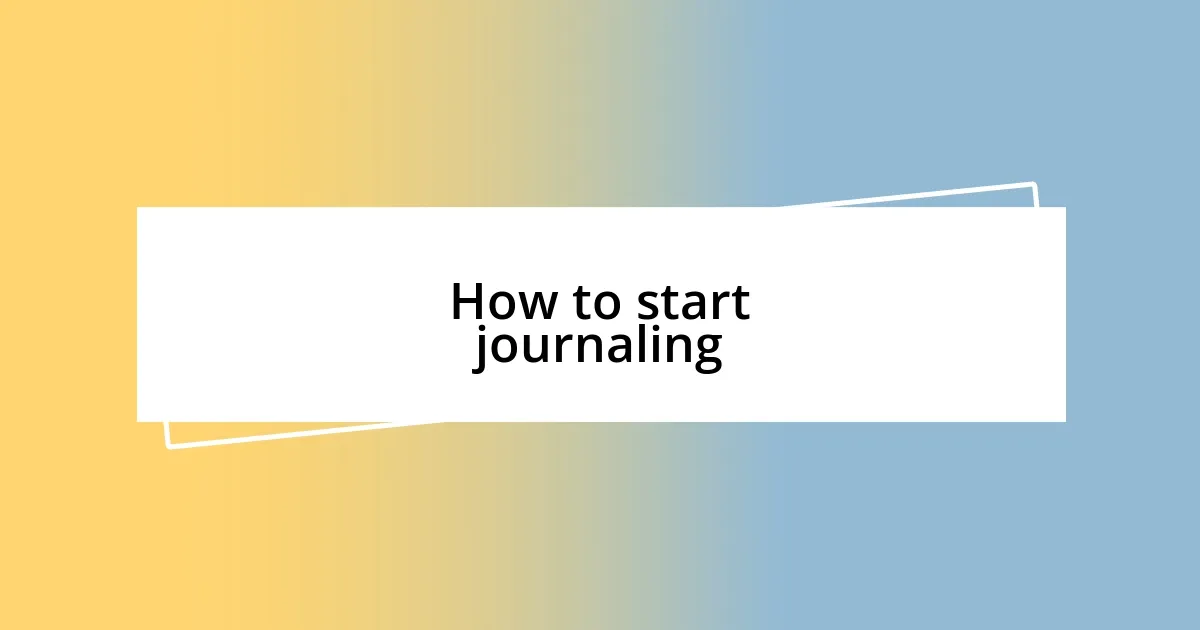
How to start journaling
Starting a journaling practice can feel overwhelming, but it’s easier than you might think. I remember my first attempt. I sat there, pen in hand, staring at a blank page feeling lost. Then I realized I didn’t need to write a masterpiece; simple thoughts or feelings were enough.
It’s all about finding a routine that works for you. Some people prefer journaling in the morning to set their intentions for the day, while others find solace in reflecting at night. I’ve tried both, and I found that evening journaling allowed me to unwind and process my day.
When you start journaling, don’t worry about grammar or punctuation—let your thoughts flow freely. I often scribble down whatever comes to mind without self-editing. Trust me; you’ll be surprised at the insights that arise when you remove that pressure.
| Tips for Starting Journaling | My Experience |
|---|---|
| Write daily, even if just for a few minutes | Consistency helped me form a habit, and now I look forward to it. |
| Don’t focus on perfection | Letting go of my need to write perfectly has made the process enjoyable. |
| Use prompts if you’re stuck | Using prompts sparked creativity during my initial awkward sessions. |
| Find a comfortable space | Settling into a cozy nook made all the difference for me. |
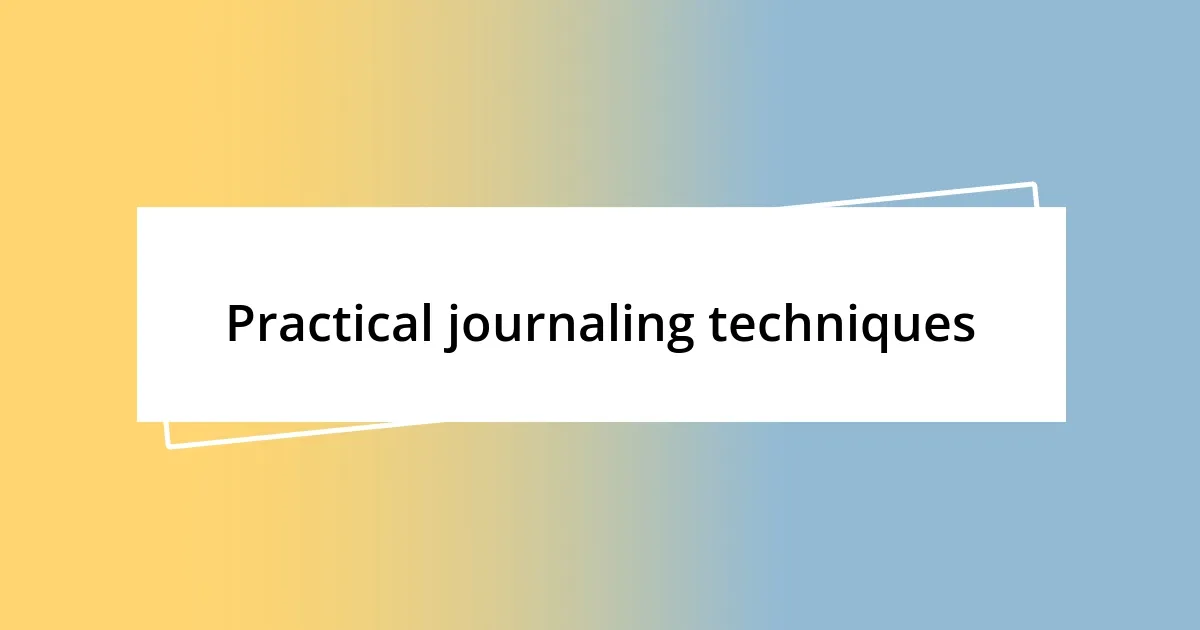
Practical journaling techniques
Over the years, I’ve discovered some practical journaling techniques that really transformed my experience. One effective method is the use of prompts. When I hit a mental block, a simple question like “What made me smile today?” sparks a flow of thoughts that I never knew were there. There’s something about the gentle nudge of a prompt that unlocks deeper emotions I often overlook.
- Themed Journals: I personally enjoy dedicating journals to specific themes, like gratitude or self-reflection, which helps me stay focused and intentional.
- Time-Limited Writing: Setting a timer for five or ten minutes allows me to pour out my thoughts quickly and without overthinking.
- Artistic Expression: Occasionally, I incorporate doodles or sketches that capture my feelings in a different light, making the experience more enjoyable.
- Reflective Questions: At the end of each week, I ask myself what I’ve learned, which deepens my understanding of my own journey.
Another technique that has proved invaluable is the practice of free writing. I remember the day I first tried it; I set a timer for ten minutes and just let my pen glide across the paper. Initially, I felt unsure, but then it transformed into a cathartic experience, allowing my subconscious to spill out thoughts and emotions I hadn’t realized were stored inside. This technique has provided me clarity and often surprises me with insights about my own life.
- Daily Check-Ins: I make it a habit to check in with my emotions each day, which helps me understand my mood patterns and triggers.
- Stream of Consciousness: Writing without stopping for spelling or punctuation frees me from the inner critic that sometimes holds me back.
- Color-Coding: I’ve started color-coding my entries based on themes like joy, stress, or reflection, which visually highlights where my focus has been.
- End-of-Month Reflections: This technique helps me appreciate the growth I’ve made over time, reminding me of both struggles and accomplishments.
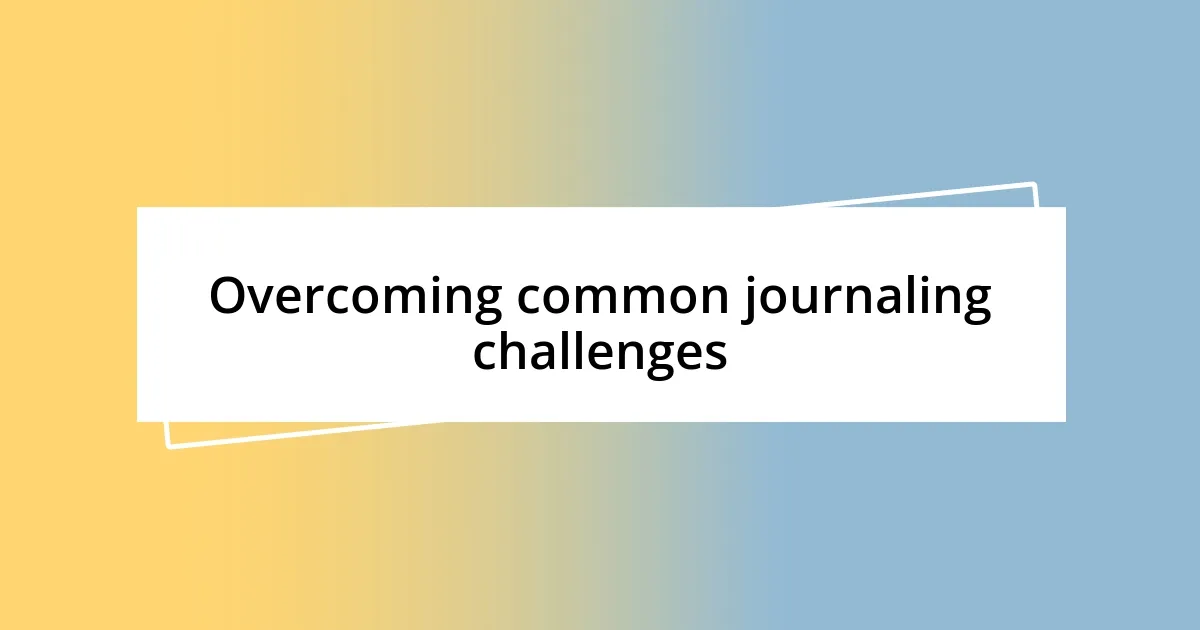
Overcoming common journaling challenges
When I first started journaling, one of the biggest challenges was simply finding the time. I often found myself too busy, caught up in the whirlwind of daily tasks. But I learned that even just five minutes in the morning or evening could be transformative. Have you ever felt like there’s just no time in the day? I realized that by making journaling a priority, those fleeting minutes can lead to some of the most insightful moments of my day.
Another hurdle was the fear of judgment. Initially, I worried about what I was writing as if someone might read it. The turning point came when I decided to treat my journal as a safe space—my personal sanctuary where messy thoughts were not just welcomed but celebrated. Have you allowed yourself that freedom? Embracing the rawness of my feelings without filtering them unleashed a powerful wave of creativity and healing.
Finally, the lingering question of “What should I write about?” often clouded my thoughts. At one point, I began keeping a small list of prompts that resonated with me when inspiration hit. It was a game changer! I’d flip to that list on days when my mind felt empty and found that even the simplest questions could lead to profound reflections. This approach has been instrumental in maintaining my journaling habit, and I encourage you to try creating your own list. What’s on your list of prompts that could spark your imagination?
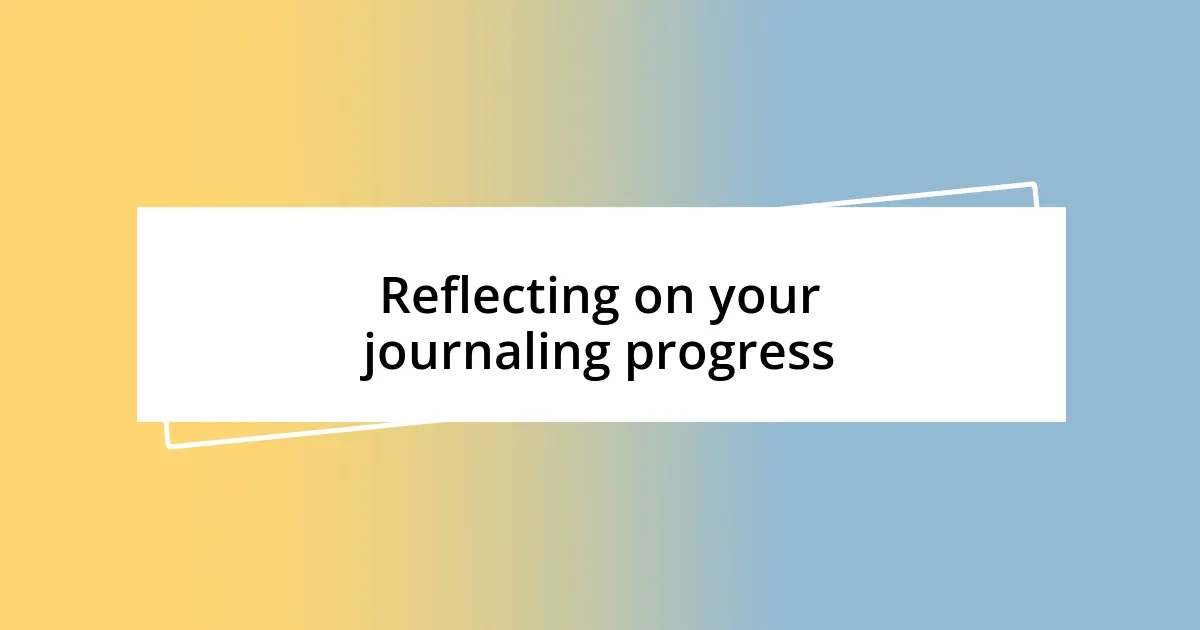
Reflecting on your journaling progress
Reflecting on my journaling progress has become a powerful tool for growth. I often take a moment to look back through my previous entries, and it amazes me how far I’ve actually come. For instance, when I revisit entries from months ago, I can see patterns in my emotional responses that I’ve since learned to navigate more gracefully. Have you ever experienced that revelation when looking back at your own writing?
One of the most emotional aspects of this reflection is recognizing my resilience during tough times. I remember journaling about a significant life challenge, feeling overwhelmed and unsure. Now, reading those words, I can see how I found strength I didn’t know I had. It’s like witnessing my own journey unfold on the pages, and I often ask myself, “What did I learn from that experience?” This practice not only deepens my understanding of myself but also provides a sense of closure or celebration, depending on the moment.
Sometimes, as I reflect, I jot down a few key lessons learned from specific entries. This simple act transforms my insights into actionable goals. For example, one month, I realized the importance of gratitude in my life. Consequently, I crafted a monthly affirmation that I regularly revisit, helping me stay grounded and focused. I encourage you to think about what consistent reflections could help you cultivate in your journaling practice. What insights might you uncover about your own journey?

Incorporating journaling into daily routines
Incorporating journaling into my daily routine felt daunting at first, but I discovered it doesn’t need to be time-consuming. I started setting a reminder on my phone for a specific time each day, turning it into a habit rather than just another task. Have you tried associating your journaling time with a daily activity? For me, pairing journaling with my morning coffee made it something I looked forward to rather than a chore.
I’ve found that the environment plays a crucial role in enjoying my journaling practice. When I create a cozy space—complete with soft lighting and calming scents—it transforms the experience. One evening, after a long day, I lit a candle and found myself writing about my feelings with a level of introspection that surprised me. Have you thought about how your surroundings affect your mindset when you write? A little ambiance can truly make a difference.
Moreover, I make sure to have my journal nearby throughout the day. It serves as a reminder to take small moments to pause and reflect. Once, during a hectic workday, I jotted down a few thoughts during my lunch break, and it sparked an insightful self-conversation about my goals. Have you considered how these brief pauses might deepen your insights? Even a few lines can lead to significant breakthroughs, and it’s amazing how journaling can seamlessly fit into the rhythm of life.
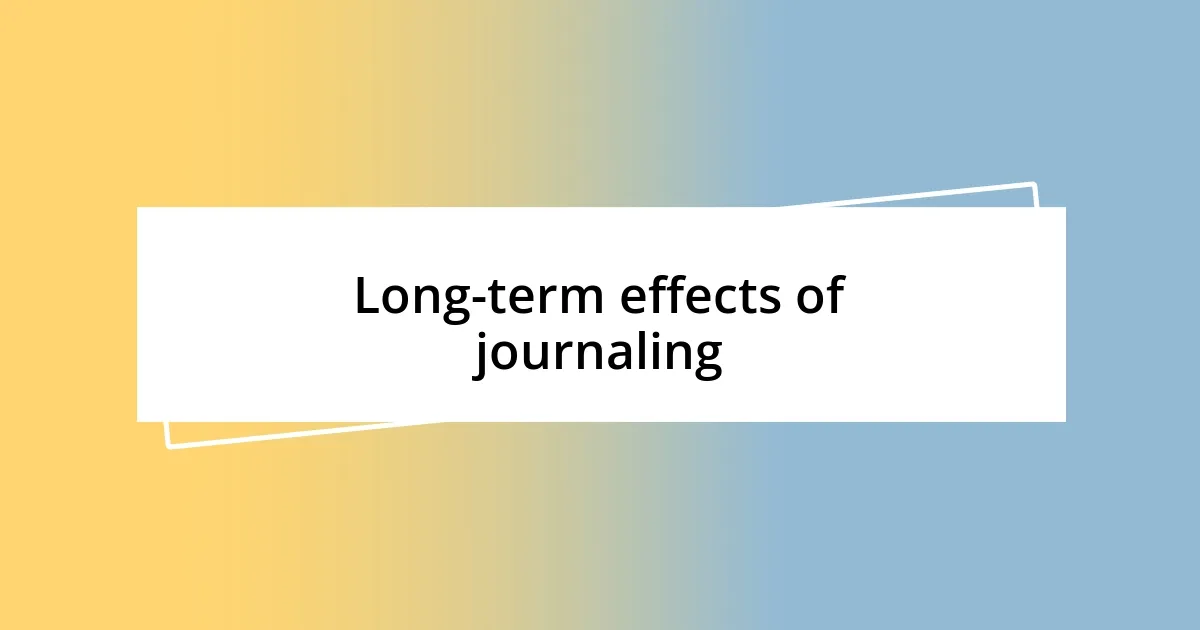
Long-term effects of journaling
The long-term effects of journaling have been incredibly rewarding for me. Over time, I’ve noticed significant shifts in my mental clarity and emotional resilience. For instance, reflecting on my journal entries from a year ago, I’ve gained a deeper understanding of how my thoughts influenced my feelings and decisions. It’s fascinating to observe my evolution over time, isn’t it?
One unexpected benefit I’ve experienced is increased creativity. I often revisit old entries and find inspiration that sparks new ideas for projects. It’s as if my past self is handing me a treasure map to unexplored paths in my current life. Have you ever looked back on your words and felt that spark of creativity igniting? Those moments can be truly magical.
In terms of emotional health, journaling has acted as a powerful release valve for my stress. There were times I’d write through anxiety about a big life change, and looking back, I see how those entries laid the groundwork for my growth. It’s incredible how much clarity comes from simply putting pen to paper. How has writing transformed your perception of past challenges? For me, it’s turned obstacles into opportunities for learning and growth.














